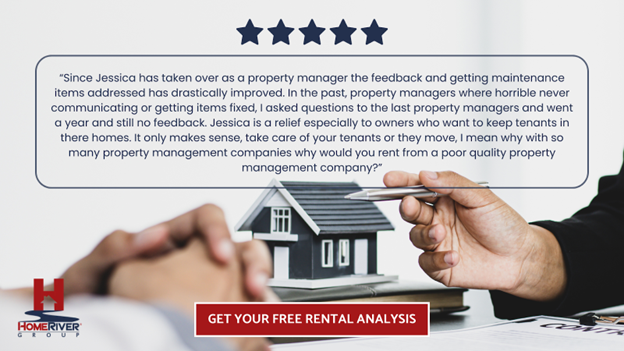
At HomeRiver Group, we understand the intricacies of property management and the nuances of rent-to-own agreements. With our exceptional service paired with local expertise, we believe in empowering renters and buyers to navigate their rent-to-own journey confidently. Our national platform and dedicated local market expertise position us uniquely to provide valuable insights into the rights and options available to renters and buyers in a rent-to-own situation.
Rent-to-own contracts allow renters to gradually transition into owners, providing a path to homeownership that doesn't require the hefty down payment typically associated with purchasing a home. However, like any contract, the dynamics of a rent-to-own agreement can be complex, and both parties, landlords and renters/buyers, must fully understand their rights and obligations. A question often arises: can a landlord break a rent-to-own contract?
This article will explore the circumstances under which a landlord might break a rent-to-own contract, the rights and protections tenants have in such agreements, and the importance of legal advice to navigate these situations effectively.
Can A Landlord Legally Break A Rent-to-Own Agreement?
Entering a rent-to-own agreement is a promising path toward homeownership, especially for those who might not initially qualify for a mortgage. It's a unique arrangement that allows renters to invest in their future homes through rental payments, with an option to buy the property after a certain period. However, an often-asked question is: can a landlord break a rent-to-own contract?
The short answer is that it is not simple for a landlord to break a rent-to-own agreement. These contracts are legally binding documents providing specific protections and obligations for both parties. In this situation, what a landlord cannot do is unilaterally decide to terminate the agreement without facing potential legal consequences unless specific conditions agreed upon in the contract arise.
Here are some instances where a landlord might legally break a rent-to-own agreement:
Breach of Contract by the Buyer/Renter: If renters fail to meet the terms of the agreement, such as timely payment of rent or maintenance obligations, landlords might have the right to terminate the contract. The agreement must clearly outline all conditions and consequences of failing to meet these conditions.
Mutual Agreement: Both parties can mutually agree to terminate a rent-to-own contract. This scenario requires the consent of both the landlord and the tenant/buyer and often involves some form of compensation or settlement agreed upon by both sides.
Use of a Legal Clause: Some rent-to-own contracts may include specific clauses that allow for termination under certain conditions, such as changes in the landlord’s financial situation or a desire to sell the property to another buyer. These clauses must be reviewed and understood before agreeing.
Bankruptcy: If a landlord files for bankruptcy, the property may become part of the bankruptcy estate. Depending on the terms of the contract and bankruptcy laws, this situation could affect the rent-to-own agreement.
Tenants' Rights In Rent-to-Own Arrangements
In rent-to-own agreements, the line between being a tenant and an eventual homeowner can seem nuanced, but the rights afforded to tenants in these situations are clearly outlined in the lease agreement itself. Understanding these rights is crucial for renters and buyers in protecting their investment and future homes.
The Right To A Safe And Well-maintained Property
Tenants are entitled to a property that meets housing codes and is properly maintained. Landlord responsibilities include major repairs unless stated otherwise in the contract, ensuring the property remains safe and habitable.
The Right To Privacy
Tenants in rent-to-own agreements have the same privacy rights as traditional renters. Landlords must provide notice—typically 24 to 48 hours—before entering the property, except in emergencies.
Protection Against Unfair Eviction
Tenants cannot be evicted without legal court procedures. Adhering to the agreement terms is crucial, as any breach may nullify the agreement and lead to eviction.
The Exclusive Option To Purchase The Property
A defining feature of rent-to-own agreements is the tenant’s exclusive right to buy the property under predetermined terms. This option often requires a nonrefundable fee, which is credited toward the purchase price if the tenant opts to buy.
What To Do If Your Landlord Breaches The Contract
Finding yourself in a situation where your landlord has breached your rent-to-own contract can be unsettling and confusing. Knowing the steps to take can help protect your interests and save your path to homeownership.
Here are some guidelines on what to do if you find yourself in this precarious position:
Step 1: Review Your Contract Thoroughly
Begin by closely reviewing your rent-to-own agreement. Understanding the specifics of your contract can help you determine whether a breach has occurred. Look for clauses related to termination, breach, and remedies. Knowing the exact terms can provide a clear standpoint when addressing the issue.
Step 2: Document Everything
Start collecting and organizing any communication and documentation related to the breach. This includes saving emails, text messages, and letters and keeping detailed notes of verbal interactions. Documentation will be crucial if legal steps become necessary.
Step 3: Reach Out To The Landlord For Resolution
Sometimes, direct and professional communication can solve the issue. Contact your landlord to discuss the breach and express your interest in finding a resolution that keeps your rent-to-own agreement on track. The breach may be due to a misunderstanding or an oversight that can be corrected.
Step 4: Seek Legal Advice
If direct communication doesn’t lead to a resolution, or if the breach of contract is clear and significant, it may be time to seek legal counsel. A legal advisor specializing in real estate transactions can provide options based on your circumstances. This could involve sending a formal notice of the breach to the landlord or initiating a lawsuit to enforce the contract terms.
Step 5: Consider Alternative Dispute Resolution (ADR)
Before heading to court, consider alternative dispute resolution methods such as mediation or arbitration. ADR can be a faster, less adversarial, and less expensive way to resolve disputes. Both parties must agree to this route, but it can lead to a fair resolution without a more formal legal process.
Step 6: Prepare For Possible Litigation
Should all attempts at resolution fail, be prepared for the possibility of litigation. Your legal counsel can guide you through this process, which will involve presenting your case and all supporting documents and evidence to a judge or jury.
Protecting Your Investment: Tips For Tenants
In rent-to-own agreements, both tenants and landlords have significant investments and responsibilities on the line. As a renter or buyer entering this contract, protect your investment by staying informed and proactive.
Here are essential tips to ensure your rent-to-own journey is secure and aligned with your long-term goals:
Understand Your Contract Fully: Thoroughly review your rent-to-own agreement, ensuring all terms, including rent, option fees, purchase price, and responsibilities, are clear. Seek clarification or legal advice if needed.
Keep Detailed Records: To safeguard against potential disputes, keep records of all payments, rent raises, receipts, and correspondence with your landlord.
Secure A Right To Inspection: Negotiate for professional property inspections before signing and during the tenancy to identify issues and avoid responsibility for pre-existing conditions.
Ensure Legal Compliance: Have a lawyer review your contract to confirm it complies with state and federal regulations and protects your interests.
Stay On Top Of Payments: Make timely payments to maintain your agreement and avoid financial penalties or eviction. Use reminders to track due dates effectively.
Plan For The Future: Prepare for homeownership by improving your credit score, saving for a down payment, and exploring financing options early.
When To Consult A Real Estate Attorney
Navigating a rent-to-own agreement can be complex and, at times, overwhelming. Understanding when it is appropriate to seek the guidance of a real estate attorney can save you from potential legal pitfalls and ensure your rights are protected.
Below are key situations in which consulting a real estate attorney is advisable:
Uncertainty About Contract Terms
A real estate attorney can clarify terms and advise on the best course of action if any part of the rent-to-own agreement is unclear or unfavorable. They can help you understand your obligations under the contract and your landlord's.
Modification Of Agreement
If there is a need to modify the rent-to-own agreement, having a real estate attorney review proposed changes can ensure that your interests remain protected. An attorney can assist in negotiating terms that are legally binding and in your favor.
Breach Of Contract
If you suspect that your landlord has violated the terms of the rent-to-own contract, a legal expert can help you explore your options. Whether pursuing a settlement or preparing for litigation, a real estate attorney will guide you.
Preparation For Ownership
As you approach the point of purchase within a rent-to-own agreement, consulting an attorney can be instrumental in ensuring that all legal requirements are met. This includes title searches, securing financing, and understanding local regulations that may affect the transaction.
Dispute Resolution
Conflict is not uncommon in rent-to-own arrangements. A real estate attorney can represent your interests if disputes arise concerning property maintenance, payment terms, or other issues. They can help mediate disputes or, if necessary, represent you in court to resolve the matter.
The goal of a rent-to-own contract is to make homeownership achievable. Do not let legal challenges deter you from reaching this milestone. Hiring property management services and consulting with a real estate attorney can provide peace of mind and ensure you navigate this journey with informed and expert advice at your side.
Final Thoughts
Navigating the complexities of a rent-to-own contract requires a keen understanding of the specific terms set forth within your agreement and the legal protections available to renters and buyers. While landlords generally cannot arbitrarily break a rent-to-own contract without facing legal repercussions, tenants must proactively understand their rights and the conditions under which a contract can be altered or terminated.
HomeRiver Group stands at the forefront of providing unrivaled expertise and support for renters and buyers navigating the rent-to-own journey. Visit us today to ensure your property concerns are managed with the utmost priority and professionalism.
Knowledge is power in any property agreement. By partnering with HomeRiver Group, you leverage our local expertise and national capabilities, securing your investment and confidently navigating your rent-to-own agreement. Your property is our priority, and we're here to ensure your path to ownership is clear, secure, and within reach.
Read also:
Frequently Asked Questions About Can A Landlord Break A Rent-to-Own Contract
Can a landlord legally break a rent-to-own contract?
Yes, a landlord can legally break a rent-to-own contract, but only under certain conditions specified in the contract, such as failure to meet payment obligations or violating other terms of the agreement. Furthermore, state laws may provide additional protections for tenants, limiting the conditions under which a landlord can terminate the agreement.
What rights do tenants have in a rent-to-own situation?
Tenants have rights outlined in the rent-to-own agreement, which commonly include the right to purchase the property at a predetermined price, live in the property for the lease term, and protections against unjust eviction. Tenants also have the right to seek legal redress if the landlord breaches the terms of the contract.
Can a tenant break a rent-to-own contract without penalty?
Breaking a rent-to-own contract without penalty depends on the terms outlined in the agreement and the state's laws. Some contracts may include clauses that allow for termination under specific circumstances, such as changes in financial status, with predefined penalties or without penalty.
What are the financial implications of a rent-to-own contract termination for the tenant?
The financial implications for a tenant can vary widely and include the loss of any non-refundable option fees and a percentage of rent payments to be applied to the home's purchase price. Additionally, tenants may face penalties as stipulated in the contract and, in some cases, lose the right to purchase the property.
What should a rent-to-own contract include to prevent early termination?
To prevent early termination, a rent-to-own contract should clearly outline all conditions of the agreement, including specific obligations of both parties, penalties for breach of contract, and conditions under which the contract can be legally terminated. It should also include dispute resolution procedures.
What is a rent-to-own contract?
A rent-to-own contract is an agreement between a landlord and tenant that allows the tenant to purchase the property at the end of a specified rental period. The contract usually specifies a purchase price, rent payments, and terms for the property sale. Depending on the terms of the agreement, portions of the rent payments may be credited toward the purchase price.










